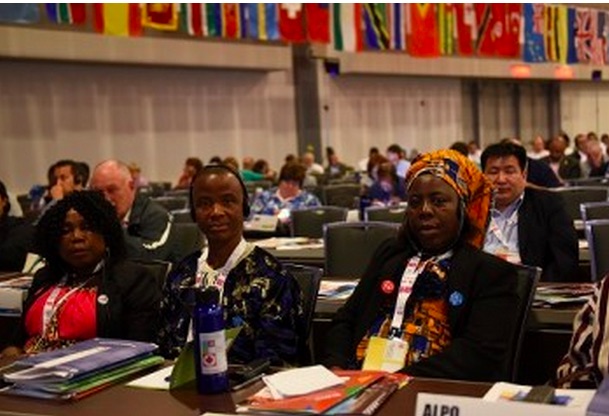EDUCATION FOR PEACE .
An article from Education International
Several resolutions were passed at Education International’s 7th World Congress on the promotion of democracy, sustainable development, fair trade, basic social service and health and safety through solidarity and cooperation among member organisations, the international trade union movement and civil society.

Photo Credit: Gabriel Castro – IEAL
Resolution 4.1: The Promotion and Protection of Standards and Values in the World “recognises four major interlinked challenges: the liberalisation of the economy, the lack of respect for agreed standards by governments, geopolitical shifts, particularly in Eastern Europe, and the rise of religious extremism,” said EI’s General Secretary, Fred van Leeuwen, who proposed the resolution on 25 July. The resolution calls on EI to work with its members and stay vigilant in response to these four global challenges, he said, adding that EI must continue to engage with the UN and other international organisations.
Speakers to the debate raised concerns about privatisation, standardised tests, violence against teachers and students, the environment, climate change, and urged unions to protect agreed standards and shared values.
Millions of children across the globe are involved in child labour, denied their right to education and health. So said James Tweheyo, Uganda National Teachers’ Union in proposing Resolution 4.2: Accelerated Action Against Child Labour in Connection with the Post-2015 Sustainable Development Goals on 25 July. “The damage to these children is too much to ignore.”
Speakers called for further actions of education trade unions in collaboration with other unions, civil society organisations, governments and international institutions to eliminate child labour. The Resolution echoed the keynote speech earlier on 25 July by Nobel Peace Prize winner Kailish Satyarthi, the founder of the Global March Against Child Labour, who said that EI, trade unions, and teachers played a key role in facilitating the building of the Global March Against Child Labour. “I refuse to think the world is so poor that it cannot bring all children to school,” he said.
Society should not have to witness the abduction and killing of students and teachers across the world, said Philipa Harvey of the National Union of Teachers (UK). She was proposing Resolution 4.3 Resolution on Education, Peace and Justice in Conflict Areas to Congress on 26 July.
The resolution instructs the Executive Board to encourage affiliates to promote peace, justice and conflict resolution. And it urges affiliates to press governments to adopt and endorse international guidelines for protecting schools and universities from military use during armed conflict.
Delegates raised concerns around extremism and school shootings and the education deficit caused by warfare and violence.
The need to promote values to combat extremism was a common theme in contributions to Resolution 4.4 Resolution on Education and Extremism. “Education is key to tackling extremism in all its forms,” said Arthur Frederick Brown, of the National Association of Schoolmasters Union of Women Teachers (NASUWT). “The role of teachers and trade unions is to promote the values of equity, solidarity, democracy, and respect for others.”
Amongst other elements, Congress resolved to ensure EI continues to demonstrate its commitment to equality and diversity and its opposition to exclusion and extremism in all its forms.